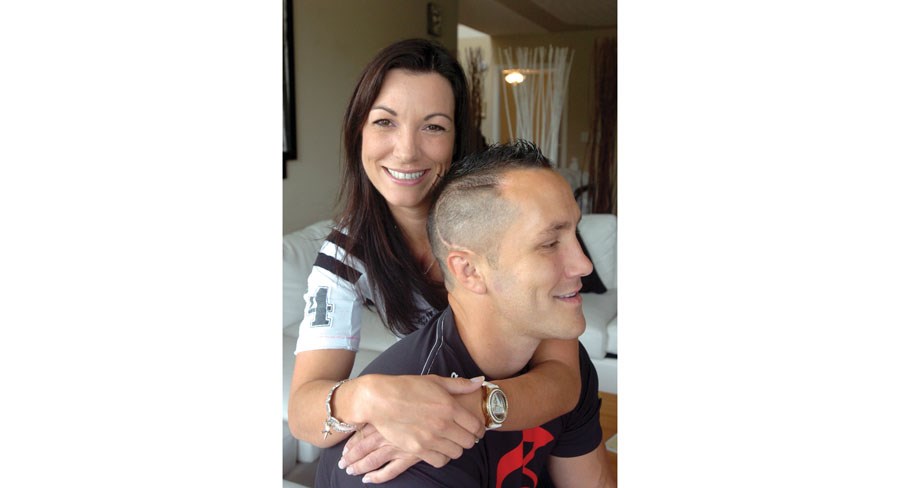Second in an ongoing series
When Jason Keller fell almost eight metres from a railing onto pavement two years ago in Surrey, it was his family who felt the pain first.
Keller suffered a traumatic brain injury as a result of his stunt gone wrong and ended up in a Vancouver hospital in an induced coma.
"The accident was the easy part for me, it was hard for you guys," Keller said, gesturing to his girlfriend Kim Feragan.
The pair sat down with the Citizen at the offices of the Prince George Brain Injured Group (PGBIG) to speak about their experience with the incident, the recovery and living with a brain injury.
"You had to go through all the pain, I didn't feel anything, I don't remember anything," Keller said. "But the rehab part is hard for me now, so we're in it together."
Keller grew up in Prince George but was living in the Lower Mainland at the time of his injury. A daredevil, Keller was trying to slide down the railing of an escalator when he was hurt. After spending months in hospital and even longer in rehab, Keller and Feragan decided to move back to Prince George.
"After this accident, we see that it's important to be around family," Keller said. "It's a good place to be right now."
The effects of a traumatic brain injury are life-changing not only for the person who suffered the injury, but also for their loved ones. It's often family members who have to assume new care-taking responsibilities and adapt to the personality changes the person with the brain injury often undergoes.
The effects of the injury can add stress to marriages and relationships, sometimes pushing them beyond the breaking point.
Keller and Feragan acknowledge they've faced new challenges since the accident, but they haven't let it take a toll on their relationship.
"Our communication is something we really need to work on," Feragan said. "Sometimes it's hard for him to understand the way I'm coming across when I say something, so then he might take it in a different manner from how I've said it."
Keller said it could be as simple as Feragan politely asking him to shut a door, which he might interpret as a rude and demanding request.
"Talking it out and trying not to lose tempers is the best way to get through it," Feragan said.
Loved ones can also be an inspiration in the immediate aftermath of a brain injury.
Chris Teichrob suffered his brain injury six years ago after a single-vehicle car crash near Vanderhoof left him with a broken neck and a severe injury to his hand. He was in an induced coma for a month and, like Keller, has had a long process of rehabilitation ever since.
With a toddler and a newborn baby at home at the time of the accident, Teichrob said his children inspired him to push through the dark times.
"If I didn't have the kids, then what's the point," he said. "I have one hand, an injured brain - I'd just be depressed. But I got through it all and here I am."
Six years on, Teichrob is still dealing with the brain injury everyday. He's lost his sense of taste and smell, his balance is poor and he's sensitive to light. When he's tired, he has a tendency to slur his words.
The effects of the brain injury, combined with the injury to his hand, has prevented him from returning to work. It's caused the family dynamics to shift and he stays home with his three children aged eight, six and two, while his girlfriend works.
"I worked since I was 16, I never finished school," Teichrob said of his life before the the injury. "I had to quit school to make money to help my mom and my sister earn money."
Despite the ongoing symptoms of his brain injury, Teichrob has been able to adapt to becoming a stay-at-home dad.
"It's kind of weird that I can remember things and do things for the kids," he said. "But when it comes to other things, I'm like 'what?' "
While Teichrob's children have had to learn to deal with their father's injury, Chris Reid's family had to adapt to his new reality when he was still a child.
Reid fell off the stairs in his Williams Lake home when he was nine years old. He was flown to Vancouver where he received treatment in both the hospital and in rehab.
When he finally did come home months later, he wasn't the same child.
"I think my brothers expected me to come home as old Chris and here I come home in a wheelchair," Reid said. "They say, 'Let's go play' but I couldn't, I didn't have the energy or the mobility."
Now 36, Reid has had many years to reflect on his injury and what it's meant for his family. His personality changed, he had less energy and motivation than before the accident and he often got himself into trouble at school and with the law because he lacked impulse control.
"I know I was a burden on everyone," Reid said. "Even now I almost feel guilt for being so dependent."
Through thick and thin, Reid's family was able to support him and, like others dealing with brain injury, Reid was able to adapt. He moved to Prince George in 1999 in part because he heard about PGBIG and wanted to access its programs.
Since then he's held a variety of jobs in the community and continues to volunteer at PGBIG as a way to socialize, talk with other people dealing with similar issues and give back to the association he feels has given him so much.
"I guess the only way to put it, is my brain injury was, it happened," he said. "There's no going back and hopping in that time machine."



